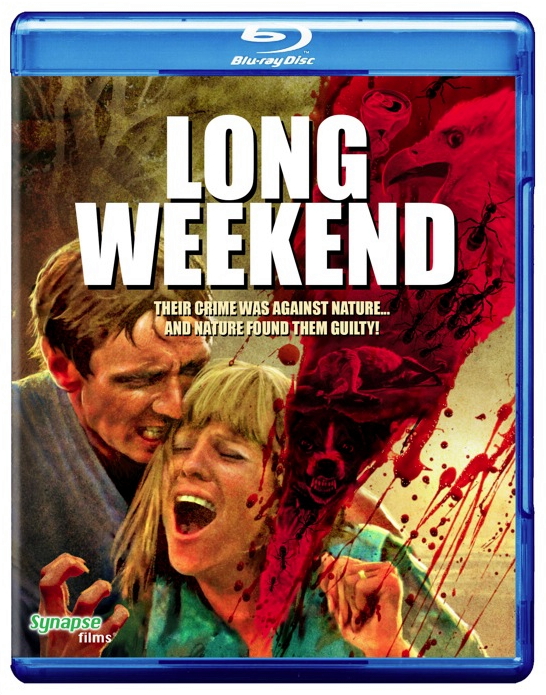
SYNOPSIS:
“The story concerns a couple, Peter (John Hargreaves) and Marcia (Briony Behets) who, along with their dog, go for a weekend camping trip. The pair show incredible disrespect for nature, especially Peter, such as polluting, killing a Dugong, throwing lit cigarette butts in dry bush, and spraying insecticide, among other transgressions. As tensions between the couple escalate, nature is not pleased with their environmental wrongdoing and starts to strike back, first by an eagle and possum attacking Peter, and then through more insidious means.” (courtesy Wikipedia)
REVIEW:
Quentin Tarantino in the documentary Not Quite Hollywood (2008): “Everything that Everett De Roche ever wrote is one of my favourite films. The film that he did that would be in my top five Australian movies is Long Weekend (1978). The storyline is about this couple that fight and bitch all the time, and they’re going out for a weekend in the woods to try to save their marriage. The genre of horror-film it would seem to take place in, is a ‘mother nature goes ape-shit’ kind of way. You start being on the animals side, because the most destructive and scary and deadly thing in this forest are these two! You want this couple to get killed but, then again, there’s another weird aspect about the film – as you watch the movie, things are not exactly what they seem to be. They never ever make it clear or say out loud if anything was wrong in the forest. That’s really trippy, and that’s really hard to pull off.”
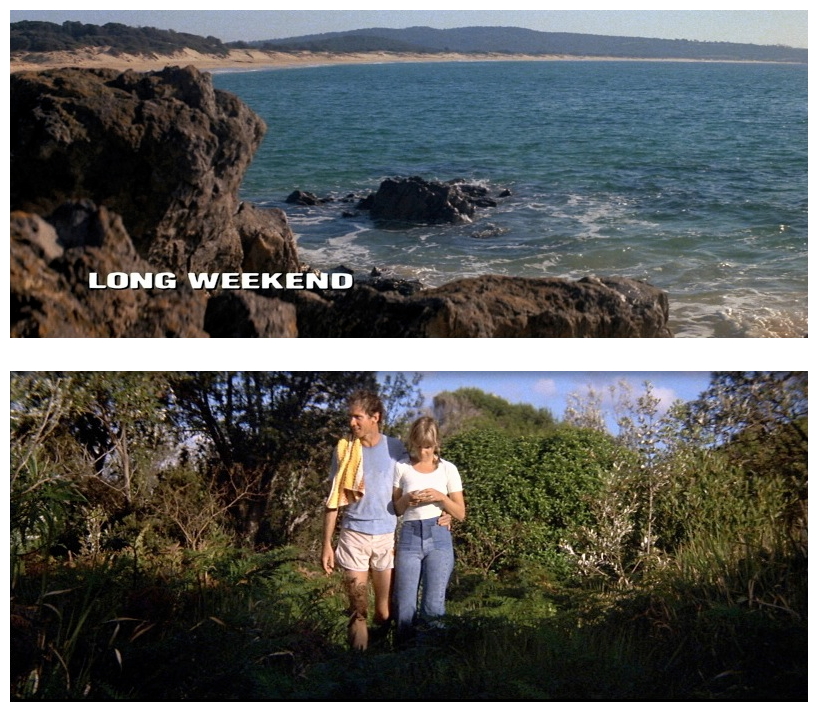
Since the Europeans first settled in Australia some 240-odd years ago they’ve spent a lot of time and effort trying to pretend they’re living anywhere in the world but Australia. As most of the early settlers came from England it was that country they tried to recreate Down Under, transplanting English architecture, gardens and culture into an environment where none of these things fitted easily. It’s due to this tradition which still persists today that a lot of Australians, including yours truly, grow up feeling somewhat alienated from their surroundings. That old cliche about Christmas in Australia is a true one – it does feel strange eating a hot Christmas dinner surrounded by cards depicting wintery landscapes while outside the temperature has climbed to 40 degrees Celsius (more than a 100 degrees Fahrenheit) and you’re being serenaded by a massed choir of a million hungry blowflies as they try to batter their way through wire screens and join the feast.
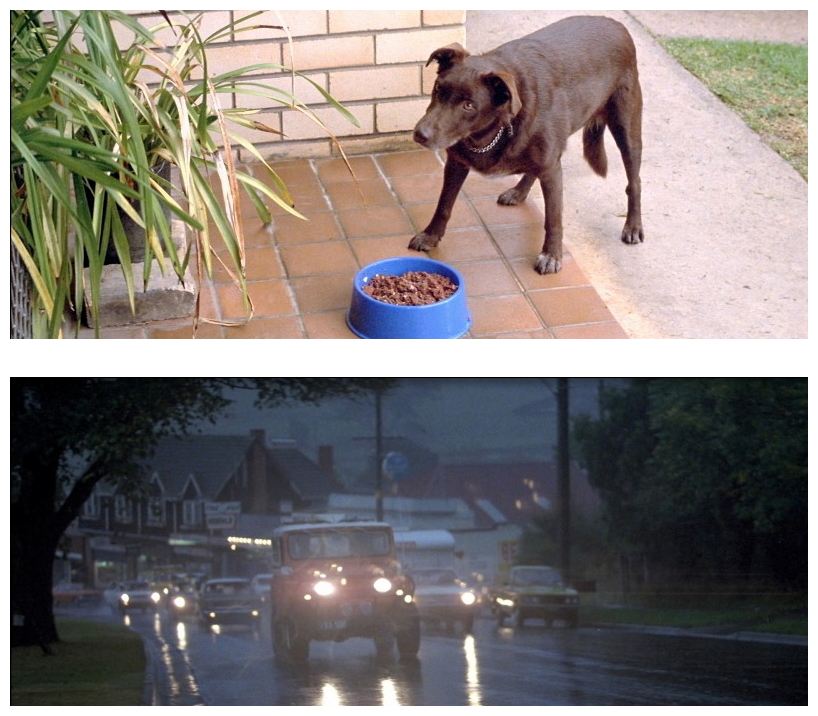
This feeling that Europeans don’t belong in Australia and that there’s something basically weird about the place was reflected in several Australian movies of the seventies, particularly the films of Peter Weir which include Picnic At Hanging Rock (1975) and The Last Wave (1977). Then came another film with similar themes but, whereas in those two movies the threat was suggested rather than shown, in Long Weekend (1978) the Australian landscape and fauna quite openly wreaks a graphic and terrifying revenge on the European interloper. The result is one of the best horror films we’ve ever exported. It begins with a young married couple – Peter (John Hargreaves) and Marcia (Briony Behets) – heading off for a weekend camping trip to a beach so remote not even the locals are aware of it. Their marriage is obviously under some strain and she doesn’t even want to go on the trip, and doesn’t share Peter’s enthusiasm for ‘roughing it’ (an attitude I entirely sympathise with).
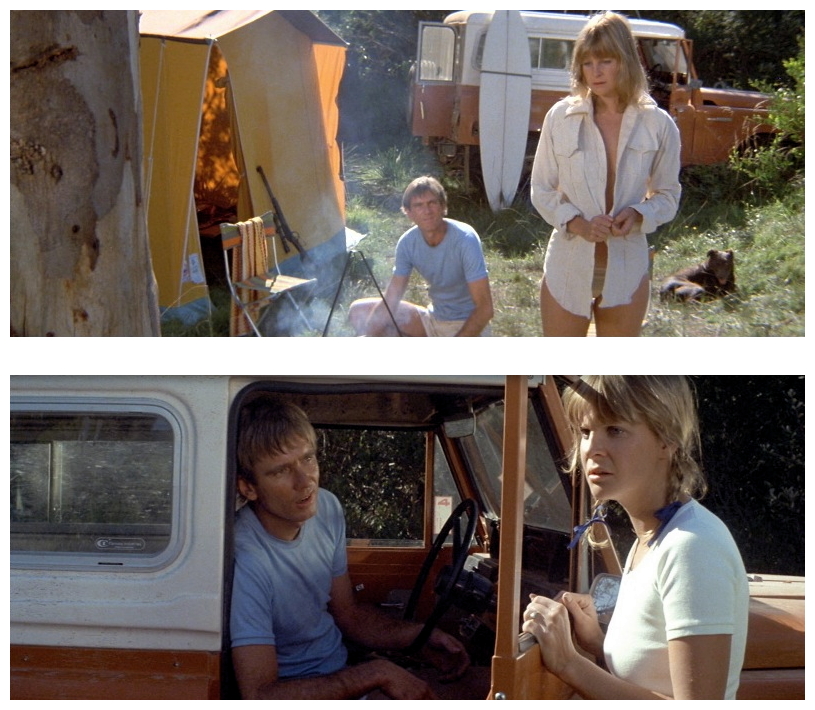
Even before the trip gets underway there are hints that all is not right, the main one being a background news bulletin about a flock of white cockatoos attacking the inhabitants of a country town, reminding us of the original nature-strikes-back movie, The Birds (1963). But the trouble really starts when they’re driving through the bush and their car hits and kills a kangaroo. Just as the killing of an albatross sealed the fate of the Ancient Mariner, so this blind act of uncaring violence seals the fate of the couple in the car. First they get lost on the bush track leading to the beach, passing the same tree marked with an arrow again and again until they are forced to stop and spend the night parked on the track. In the morning however, they find the track reaches the beach just a few metres past that particular tree. Marcia points out that there was no way they could have driven around in circles, but Peter ignores the supernatural implications and shrugs it all off, determined to enjoy himself instead.
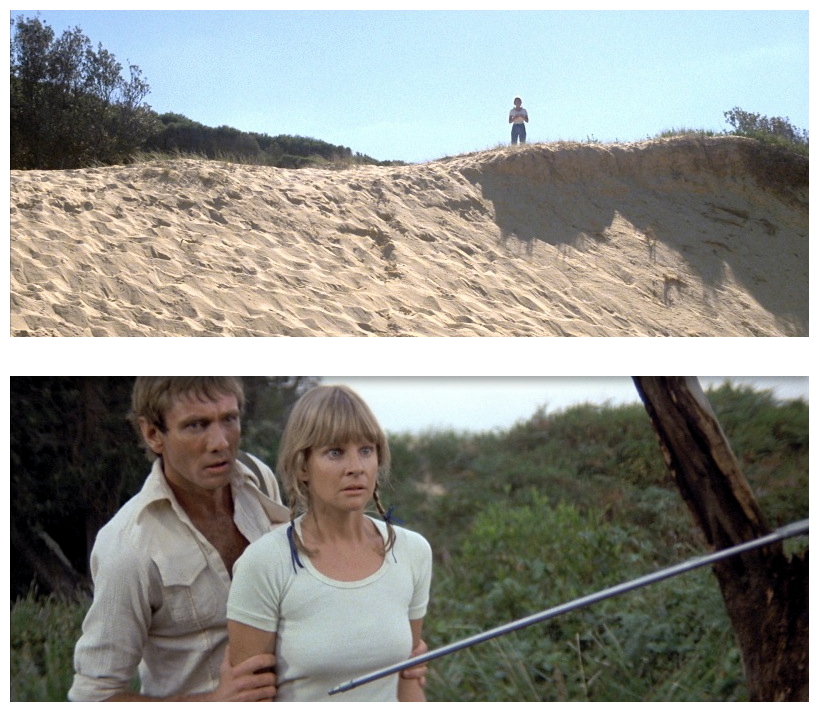
His primary source of enjoyment is to shoot at everything in the vicinity that moves and, with every shot he fires, with every empty beer can he hurls into the bush, we sense that he is driving more nails into his own coffin. Then the manifestations begin: A spear-gun fires by itself narrowly missing Marcia; a frozen chicken begins to rot even before it’s thawed; there are strange crying sounds from the bush; Peter is attacked by an eagle; and when he goes swimming he is shadowed by a large dark shape in the water. He shoots the thing in the water, presuming it to be a shark, but later a pathetic bullet-ridden sea-cow crawls onto the beach and dies, or at least it seems to. The thing won’t stay dead and keeps trying to crawl up the beach towards their camp, even after being buried. Then comes the discovery of another camp at the opposite end of the beach. What they find there convinces them of the full horror of their situation, but by then it’s too late.
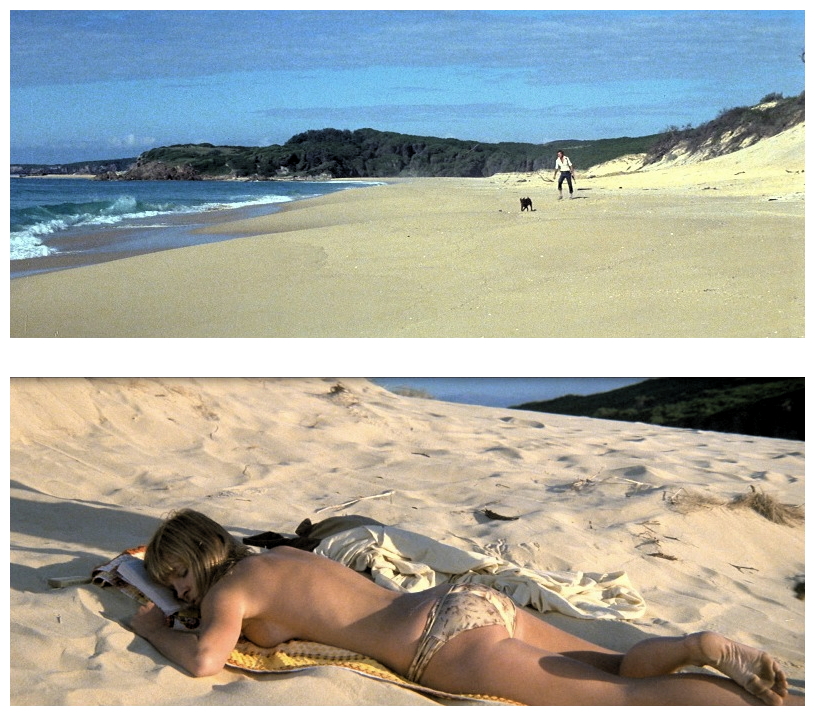
As the exterior tensions have built up around them, so too have the inner tensions created by their failing marriage. Finally their relationship breaks down completely and they attempt to go their separate ways, but by doing so totally expose themselves to the malignant force that’s after them. The last twenty or so minutes are quite harrowing, the tension is unremitting and the surprise ending suitably shattering (even though I partly anticipated it, as most viewers probably will). Director Colin Eggleston started as a film editor, one of his earliest credits being the Doctor Who story The Smugglers in 1966, and wrote and directed a number of Australian television shows and movies, most notably Fantasm Comes Again (1977) and Sky Pirates (1986), but Long Weekend remains his best work. It’s one thing to make a gloomy old house or a cavernous spaceship seem threatening, but to make a sunlit beach seem similarly frightening calls for real skill and ingenuity.
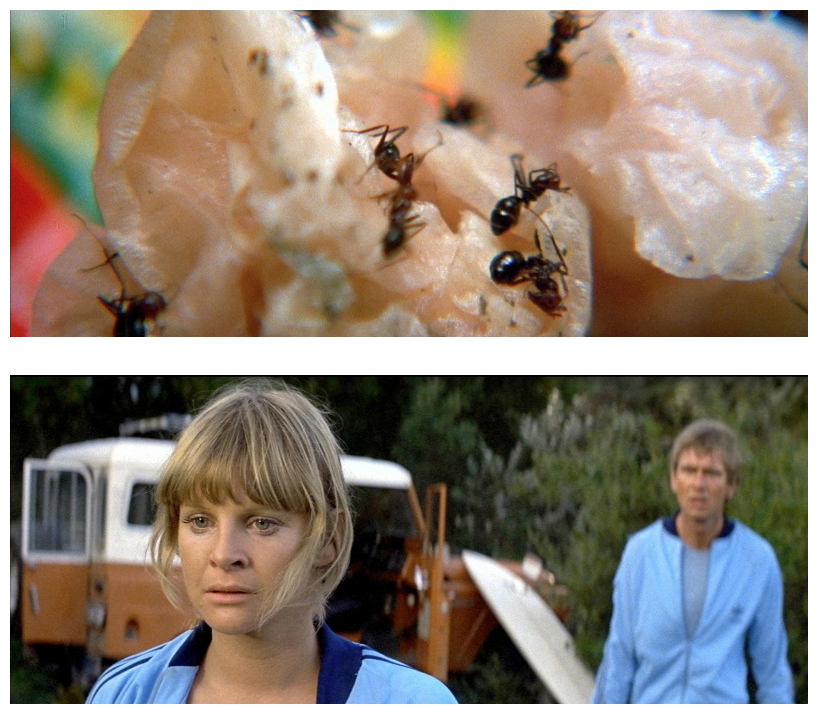
Long Weekend was the first feature script written by Everett De Roche, an experienced television writer who would be responsible for some of Australia’s best-remembered genre films, such as Patrick (1978), Snapshot (1979), Harlequin (1980), Roadgames (1981) and Razorback (1984). De Roche was inspired by a trip he took on an Easter weekend to an isolated beach on the coast of New South Wales: “I started Long Weekend as a way to avoid the TV-cop-show doldrums while still convincing myself I was ‘working’. Long Weekend was a unique project because I began with no outline, no notes or research, very little idea as to where the story was going and absolutely zero knowledge of screenplays. I simply started at page one, scene one, and made it up as I went. I had only a vague plan to write a kind of environmental horror story. My premise was that Mother Earth has her own auto-immune system, so when humans start behaving like cancer cells, She attacks. I also wanted to avoid a Jaws-like critter film. I wanted the Long Weekend beasties to all be benign-looking and not overtly aggressive.”
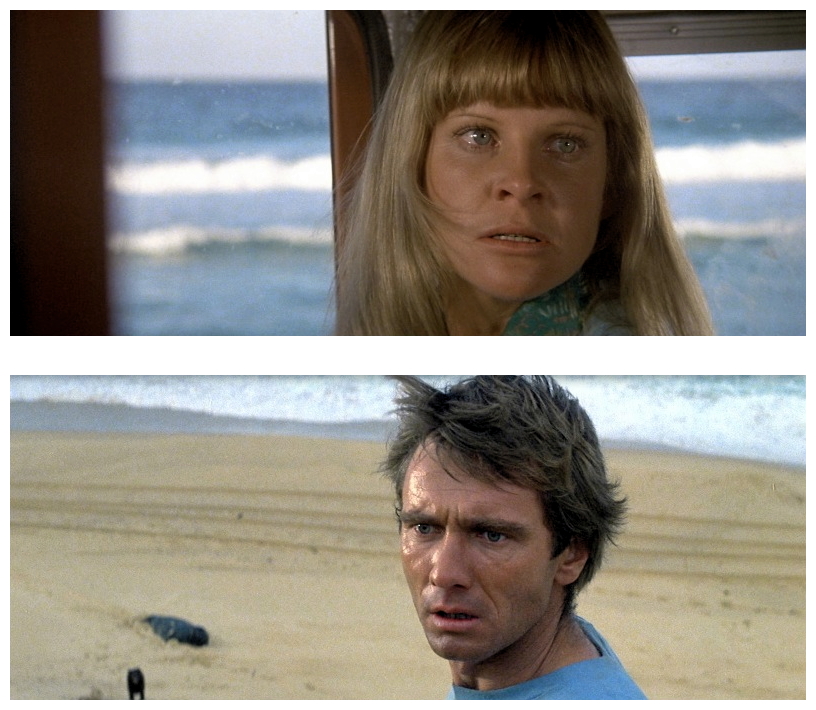
“I wrote an enormously complicated sequence for near the end where the animals give Peter a second chance. They want him to wise up, and he is at the point of doing so when he hears a truck in the distance. He dashes off to the highway, and the animals decide there is no hope. Poetically, they leave it to another man to kill him. However, his scene was too difficult to shoot because it involved animals and was cut. Unfortunately, the bush comes across as a threat too early – it should have emerged as a threat only after the audience had sympathised with the animals, and I don’t think that sympathy is there. Long Weekend would have been much better if the audience had been told at the beginning that Peter and Marcia were going to die. This way, it wouldn’t have had to sympathise with them, and could have concerned itself solely with when this was going to happen. Such is the essence of suspense.”
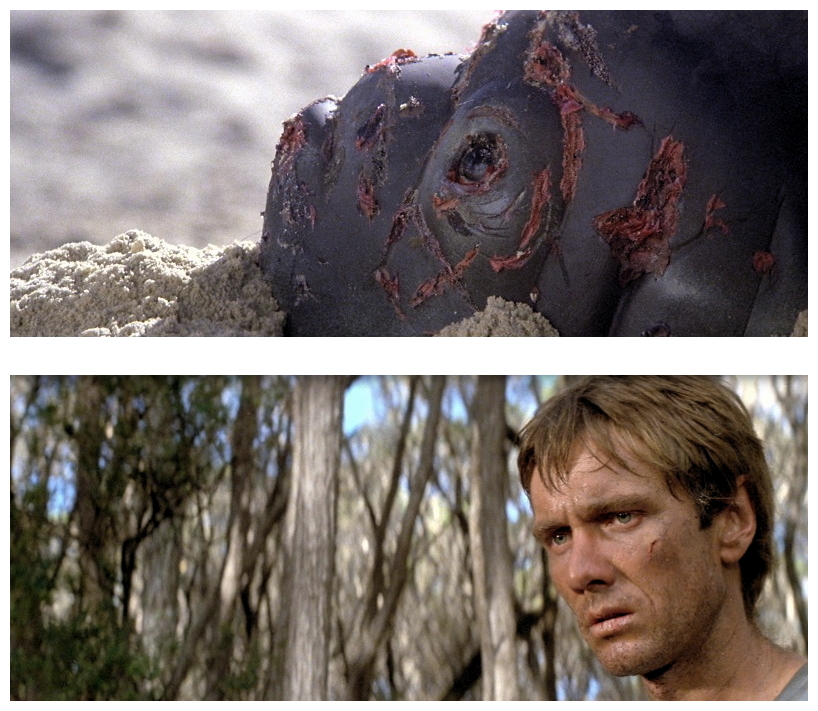
Three decades later Australian director Jamie Blanks shot a remake of Long Weekend (2008) also known as Nature’s Grave, starring Jim Caviezel as Peter and Claudia Carvan as Carla. Why do writers of remakes insist on changing character names? One particular pet peeve of mine is The Time Machine (2002), in which the main character is given the name Alexander Hartdegen. Which hat did they pull that name out of? Unnamed in the novel, he was simply called George in the 1960 film. How about the musical remake of Little Shop Of Horrors (1986)? Too hard to find words that rhyme with Krelboyne or Junior? But I digress. The remake is a major fail (0% on Rotten Tomatoes), but I recommend the original Long Weekend whole-heartedly. It’s an Australian movie that people who don’t normally like Australian movies should enjoy. At this juncture I shall respectfully request your persistence…I mean, presence next week, when your leg will be crudely humped by another cinematic dog from…Horror News. Toodles!
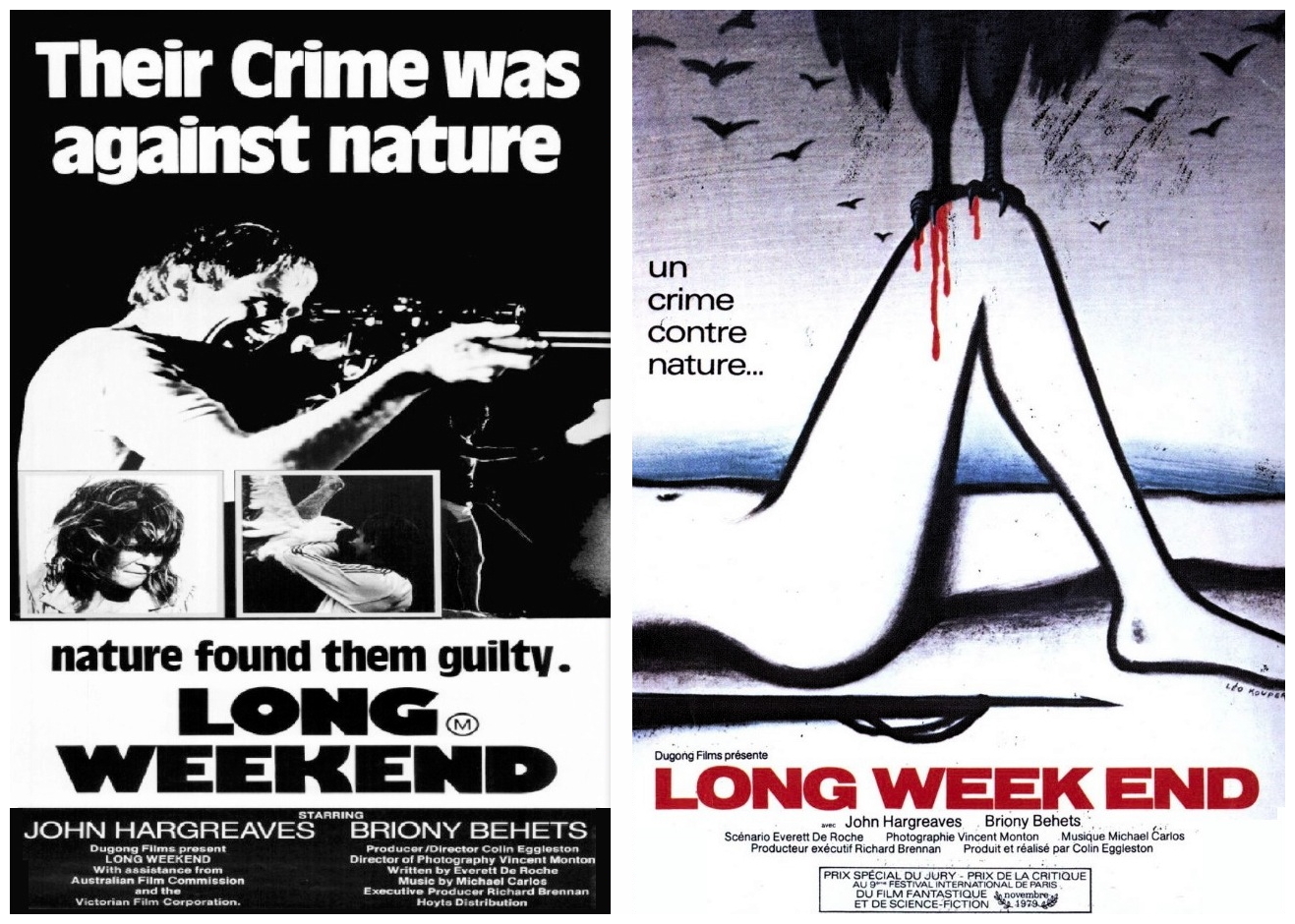
Long Weekend (1978)
 Horror News | HNN Official Site | Horror Movies,Trailers, Reviews
Horror News | HNN Official Site | Horror Movies,Trailers, Reviews

![Mad Max bluray box[1]](https://horrornews.net/wp-content/uploads/2010/08/Mad-Max-bluray-box1-238x165.jpg)




I enjoyed ‘Long Weekend’ and I didn’t think the remake was too much worse than the original (though it never really justified it’s existence). At this time I’d like to point out that one year before Everett De Roche and Jamie Blanks remade ‘Long Weekend’ they paired together to create ‘Storm Warning’ and it’s fantastic! Who knew the director responsible for the terrible ‘Urban Legend’ could make a great film if he had the right script and circumstances? C’mon Nigel, review ‘Storm Warning’ for us; it deserves much more recognition than it has ever received.
I must be honest – I have yet to see Storm Warning (2007) but will seek it out soon on your recommendation – there’s certainly lots of positive reviews for it.